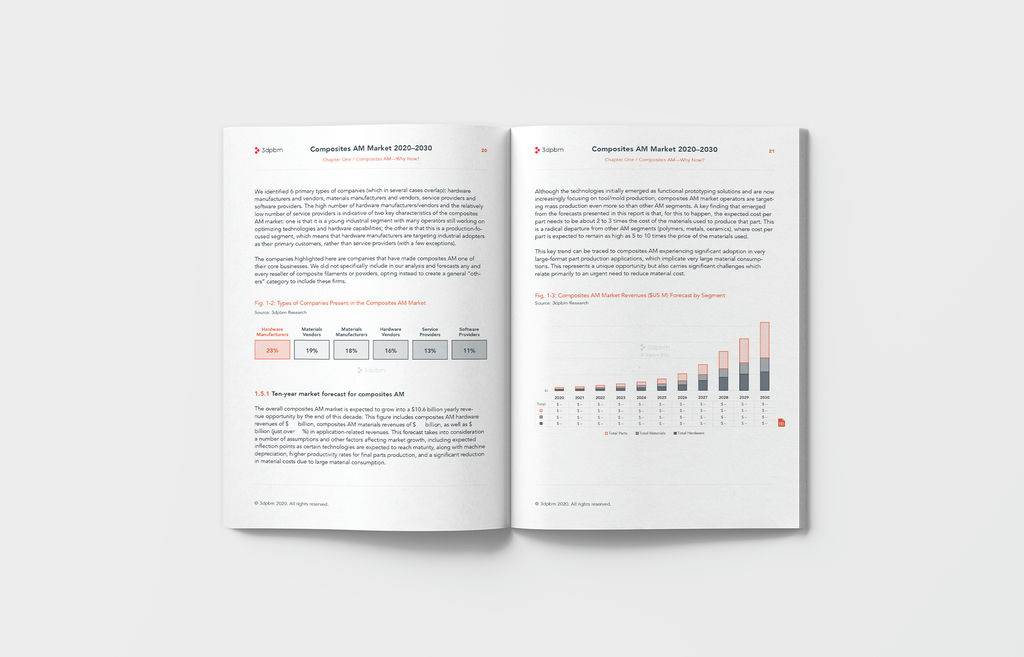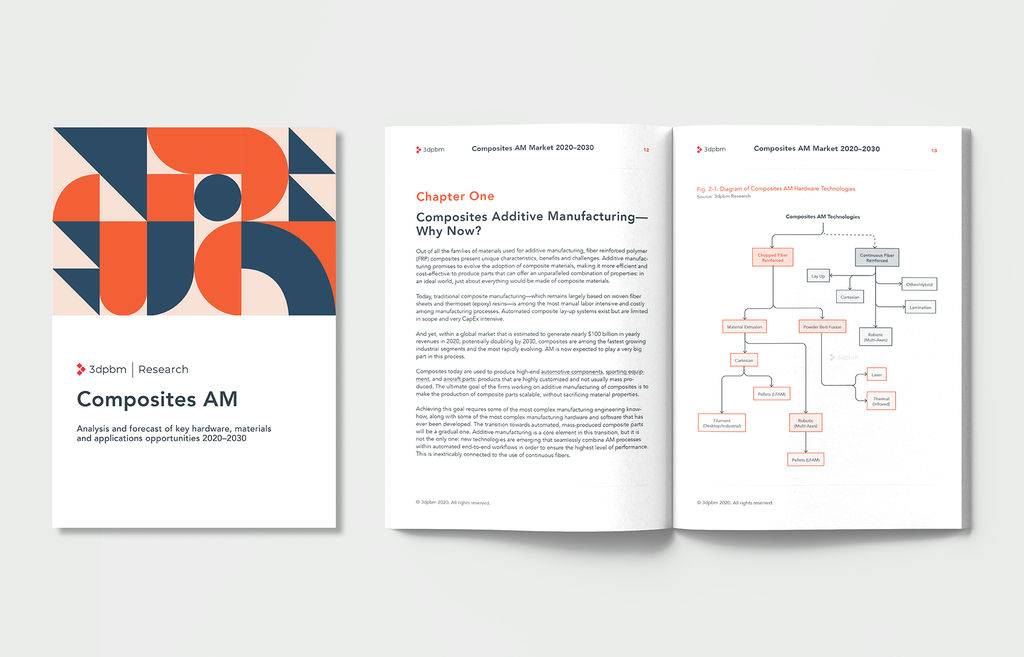3dpbm Research, the newly announced market analysis arm of 3dpbm, a leading media firm supporting the global AM industry landscape, presents the results of a comprehensive study on the composites additive manufacturing segment. The study, Composites AM 2020–2030, conducted during Q2 and Q3 2020, surveyed over 50 firms involved in the space and collected information on sales and business activity from all major companies operating in this segment. 3dpbm Research estimates that the overall composites AM market (materials, hardware, services and applications) will grow from $480 million in 2020 to over $10.6 billion by the end of the forecast period, in 2030.
Details about the report including a table of contents are available on the firm’s website at: https://3dpbm.com/research/composites-am-market-opportunities/. A summary of the report is available upon request.
3dpbm Research will hold a webinar to present some of the key findings from the study. The webinar’s date and time will be announced shortly. Additional reports on additive manufacturing topics including materials, markets and production output will follow this study. 3dpbm Research provides follow-up consultancy and engagements on research topics including drill-downs, custom briefings and customized reporting.
About the Report
The 170-page study from 3dpbm Research provides an in-depth analysis of each major sub-segment in composites AM. The report focuses on the penetration of AM in the composites market as well as hardware technology and material science evolution, culminating in an assessment of the opportunities linked with composites AM adoption for prototyping, tooling and end-use part production.
 “This research comes at a time when the adoption of additive manufacturing for composites part production—primarily carbon and glass fiber reinforced polymers (CFRP and GFRP)—is experiencing a new technological evolution and inflection point,” comments the author of the study, Davide Sher. “A consolidation is underway in the current adoption of chopped fiber materials and technologies—desktop extrusion, large-format extrusion and powder bed fusion—while a new family of mass production-capable processes is emerging that leverages and further automates continuous fiber composite part production. There is not going to be a better time to get into this market.”
“This research comes at a time when the adoption of additive manufacturing for composites part production—primarily carbon and glass fiber reinforced polymers (CFRP and GFRP)—is experiencing a new technological evolution and inflection point,” comments the author of the study, Davide Sher. “A consolidation is underway in the current adoption of chopped fiber materials and technologies—desktop extrusion, large-format extrusion and powder bed fusion—while a new family of mass production-capable processes is emerging that leverages and further automates continuous fiber composite part production. There is not going to be a better time to get into this market.”
In this study, users will find current assessments of the composites AM opportunity, including market positioning of all the key players along with demand and revenues forecasts for each hardware, materials, software, services, application and vertical adoption subsegment. All data is further broken out into each specific technological family, material type and form factor (for both matrix and reinforcement materials).
Leading and emerging companies addressed in the report include: Markforged, 9T Labs, EOS, SABIC, Ingersoll, Thermwood, Stratasys, CRP Group, Desktop Metal, Lehmann&Voss, DSM Additive Manufacturing (now part of Covestro), Solvay, Hexcel, CEAD, Electroimpact, Continuous Composites, Orbital Composites and several more.
In addition to supporting the market analysis and development efforts of suppliers, the report is targeted towards firms looking to enter the market and capitalize on developing opportunities, companies looking to implement AM for composites part production, helping them quickly and accurately understand the available possibilities and investors looking for the next disruptive production technologies and applications.
Key Takeaways
3dpbm identified the markets for large-format chopped fiber pellet material extrusion (LFAM) and powder bed fusion (PBF) as key the near and medium-term opportunities for composites AM. Newer hybrid material processes that combine extrusion/automated layup technologies are seen as a strong long-term bet.
The report found that composite material sales are going to represent a significant share of the overall revenue opportunity. This is a significant departure from other AM materials segments—such as metals, advanced ceramics and even polymers—where the value of the final parts produced can be more than ten times greater than the cost of the materials used. In composites, this ratio is expected to shrink between 2 and 3 times by the end of the forecast period, as the market moves towards mass production of parts.
As new means of transportation—including electric mobility (by land and air), personal mobility and personal aerial transportation—are developed, the weight to strength ratio required to ensure a viable level of efficiency and mileage will require increased adoption of composite materials for metal replacement. The superior properties of composites FRPs will also demand greater use over unfilled polymers, as material prices are reduced by greater hardware throughput capabilities. All these elements contribute to driving significant overall growth in this segment.



